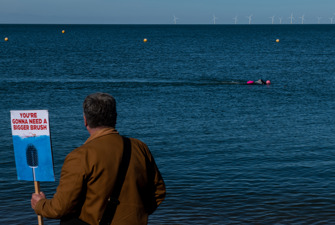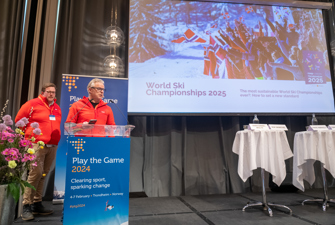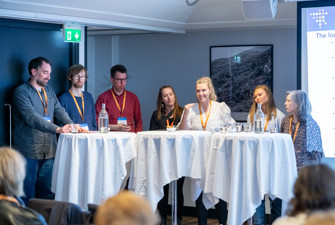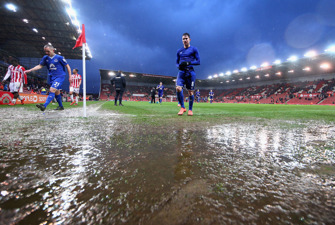Sport and climate change: How resources industries use community sport for their social license to operate
COMMENT: While popular attention focuses on elite sport and major events, the world of community and youth sport is used by the resources industries to legitimise their businesses. The salmon industry in Tasmania is a case in point.
Comments on playthegame.org reflect the views of the author(s).
Resource industries around the world – including those who contribute to the climate crisis through coal and gas mining – use sports sponsorship to maintain their social license to operate.
Social license is a complex and increasingly common term that features prominently in political and media debates about the environmental impacts of commercial resource extraction. It is particularly prominent in relation to mining, agricultural, forestry, and aquaculture industries and their efforts to legitimise access and use of local landscapes and waterways for profit.
But how does it work in practice? The salmon industry is a useful case study for understanding sports’ role in creating the conditions required to maintain a social license to operate. We start with scenes from the small town of Tribuanna (population 905) in the southern island state of Tasmania in Australia.
The Triabunna Roos Mixed Under 9s is a typical country town Australian Rules football team. Some of the kids are piling in at the goals, boots flying in the general direction of the ball. Others hang back, more interested in the seagulls from the nearby beach brawling over the scraps of pies and chips near the canteen.
On special weeks, a parent films the full game and uploads it to YouTube with links from the club’s Facebook page. These videos collect ‘likes’ by local and state politicians, as well as representatives of Triabunna’s main employer, salmon company Tassal. Tassal is the main sponsor of the Roos, as the children’s jerseys clearly show.
Salmon production is a fast growing industry
Tassal is part of the salmon industry in Tasmania which has grown from a 56-tonnes harvest in 1986-87 to 83,000-tonnes in 2020-21. It is now one of the island’s biggest primary industry sectors, employing about 2,000 people. Currently valued at AUD $650 million, the industry and state government plan for that figure to triple by 2030.
Three salmon companies are currently almost fully reliant on access to Tasmania’s southern estuaries for their operations. But these are also the places where locals have played and relaxed and fished for generations. Lifestyles on the coast help compensate for the island state’s generally lower incomes, poorer health indicators, and higher food and fuel prices compared to Australia’s mainland.
It can be distressing to both local people and the environment when commercially run salmon pens move in. Around-the-clock noise and lights appear on an industrial scale. The changes wrought on these environments are linked to extinction threats to local marine species, accusations of breaches of animal welfare, and green algae outbreaks, amongst other problems. There have been calls for boycotts and celebrity-led protests against salmon farming, including by Booker Prize-winning author Richard Flanagan.
The salmon companies fight back in order to maintain the support of locals for continued access to estuaries and to promote their claims of environmentally sustainability in export markets. Recent research by Arnt Fløysand and colleagues in Norway suggests that "the Australian salmon farming industry stands out as a case that has been remarkably proactive in negotiating its regional dilemmas". How has it done this?
Organised amateur and youth sport is a way to connect with the local community.
Census data shows that about 28 per cent of Australians aged 15 or over participate in organised sport, which is a figure that rises in regional areas. Australian Rules football is one of the most popular sports from the time children start school. It is also the most watched football code in the media and in person in Tasmania.
Salmon company Tassal’s ‘Sustainability Report 2022’ (a 75-page brochure) mentions ‘community’ no less than 46 times. "What Matters – Community Engagement" is presented a company value, with the company "committed to being a responsible neighbour and having a positive impact in the communities where we live and work".
And sports sponsorship? "We have a long history of supporting local organisations and are committed to supporting groups that foster and enhance the engagement and connectivity of the communities where we operate," says the Tassal company website.
Sponsorships can provide the cost of team jerseys, player registrations, pop-up goals, line-marking equipment, and salmon for special social events. A typical Facebook post about the Triabunna Roos reads: "We were thrilled to have a Tassal rep at their presentation evening last weekend and have some familiar faces win Club Man of the Year … This is what community sport is all about!"
Finally, meet Tassal employee Noah, who affirms, "Tassal has a strong sense of community and I have found that being part of a team environment from a young age in sport has really helped me both in and out of work. It’s great that Tassal engages with the community and supports sports teams."
Sport provides the social in 'social license to operate'
Faced with conflict over the environmental impacts of a disruptive yet rapidly expanding industry, salmon companies co-opt and brand local communities in their marketing. The ‘social’ in social license here is generated by community involvement in sporting teams and activities, thereby enlisting locals in the promotion of the company.
International markets are increasingly concerned about environmental sustainability and vulnerable to accusations of supporting social and/or environmental harm at sites of production and procurement. Sport is a powerful vehicle in helping companies provide evidence to overseas buyers that the industry has strong local community support. Nothing to see here apparently, even as the documented damage to marine ecosystems caused by salmon farming continues.











